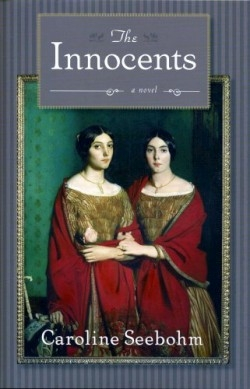The Innocents
If fiction is the art of painting pictures in words, Seebohm’s historical novel, The Innocents fascinates with its hues. The book opens with a sepia-toned portrait of the Crosby twins’ retreat from the debutante life of Edwardian Manhattan, lulling the reader into expectations of a Jamesian-like resolution—until the plot explodes in the garish light of a World War I bomb.
Seebohm, a journalist and biographer of Conde Nast and Marietta Tree, has written a memorable historical novel about two privileged sisters. Orphaned in childhood, identical twins Irene and Dorothea, are wards of their brother George and his wife with whom they share a Park Avenue apartment. By late adolescence “Their faces reflect optimism and confidence, a cheerful mirror of the times,” writes Seebohm, underscoring the book’s title and presumed message. Subsequent to graduation from elite St. Mary’s, the twins ride horses in Central Park and experiment with writing. Dorothea, especially, enjoys “disappearing into the magic of language,” where she finds “liberation from the real world.”
By March 1911 the real world intrudes when the twins react to the tragic Triangle Shirtwaist Factory fire by volunteering for the Red Cross. Months later, still numbed by those deaths, Iris and Dorothea obsessively visit the victims’ relatives in tenements, returning “ravaged and ferverish,” and alarming their brother.
To distract them, George sends them on a tour of France with their former teacher Adeline Wetherall, repeating that annually until the start of World War I. Profoundly disturbed by reports of Continental destruction, the socially-conscious Iris and Dorothea finally vow to return to their beloved, now shattered France, arriving there in November 1917.
Upon their arrival the sepia hues of the The Innocents disappear in favor of the garish lights of wartime Paris. After a brief waiting period, Iris and Dorothea are dispatched to a grim army hospital in northeastern France, near the village of Plotieres, unnervingly within hearing distance of falling bombs. Horrified by the torn, dying bodies of French soldiers, Iris and Dorothea are quickly transformed into skilled nurses—les anges, “the angels,” as they are called by their expiring patients.
Like the war itself, the plot of The Innocents accelerates, flickering through the lives of American soldiers and nurses caught in often ill-fated romances. Iris and Dorothea are no better protected from the aftershock of wartime passion than their patients are from its deadly shrapnel. In the final scene, the Crosby twins deliver a shattering message that belies their generation’s heroic rhetoric about the nobility of war.
The one area where Seebohm’s novel disappoints is the colorless, often predictable letters sent back to the states; but readers are soon compensated by The Innocent’s haunting conclusion.
Reviewed by
Nancy Rubin Stuart
Disclosure: This article is not an endorsement, but a review. The publisher of this book provided free copies of the book to have their book reviewed by a professional reviewer. No fee was paid by the publisher for this review. Foreword Reviews only recommends books that we love. Foreword Magazine, Inc. is disclosing this in accordance with the Federal Trade Commission’s 16 CFR, Part 255.

